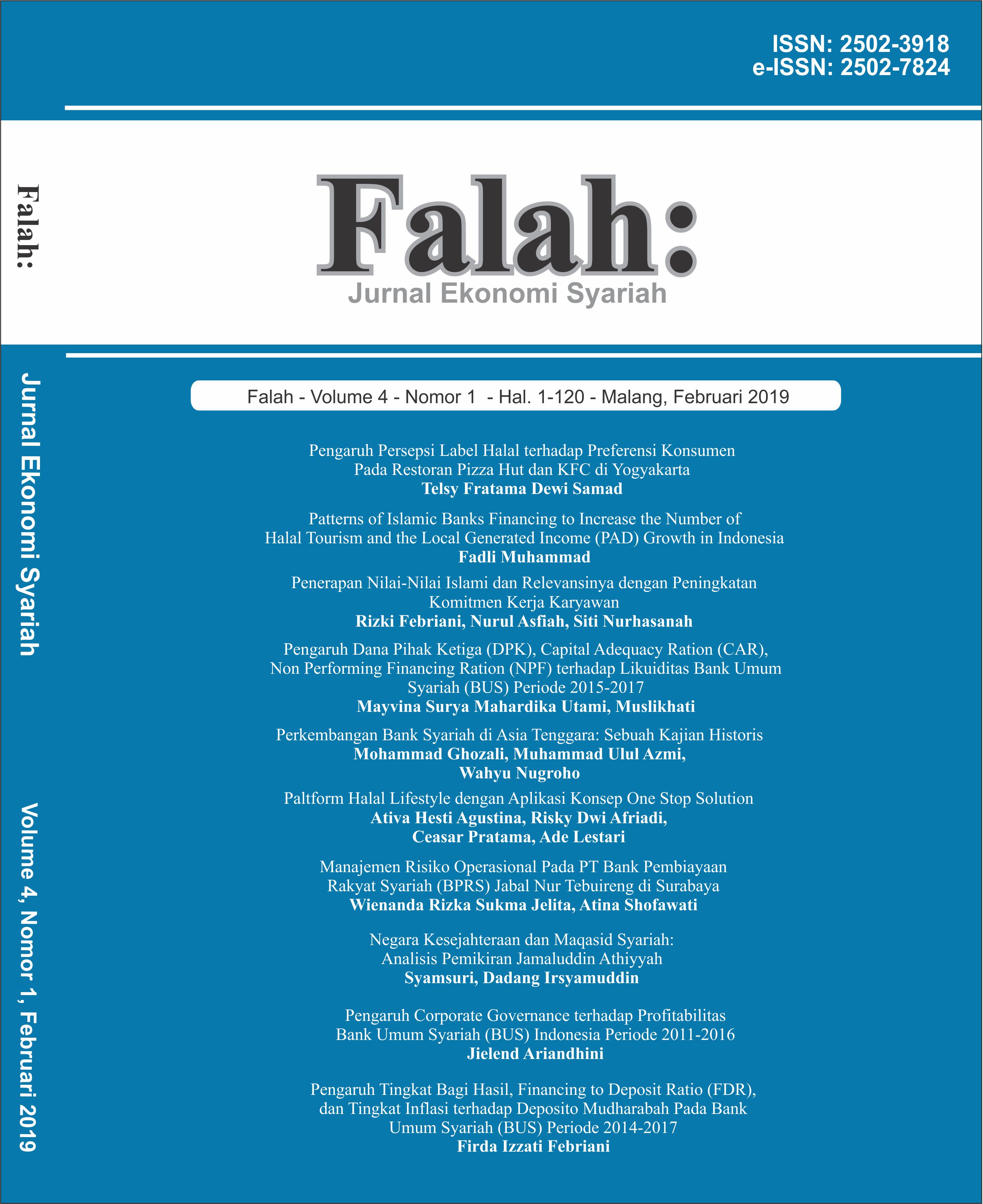Platform Halal Lifestyle dengan Aplikasi Konsep One Stop Solution
DOI:
https://doi.org/10.22219/jes.v4i1.8699Keywords:
Halal Lifestyle, Halal Tourism, Application.Abstract
This research focuses on halal lifestyle as a market segment of Indonesian society. In Indonesia which has the largest majority of Muslim population, so the need for halal lifestyle needs for millennials, is faced with the situation of potential halal lifestyle developments that has not been optimally well and demanded by the presence of increasingly advanced technology. This study analyzes the SWOT approach to get answers about the importance of halal lifestyle in Indonesian society. The results of the study introduce and create opportunities and a large market share for Indonesia by using communication technology, especially the internet, which can provide a one stop solution in the form of halal lifestyle applications so as to maintain maqashid syariah.
Downloads
References
Alom and Haque, (2011). Marketing: An Islamic Perspective. World Journal of Social Sciences Vol 1 No 3
Al-Qaradawi, S. Y. (2001). The Lawful and the Prohibited in Islam (2nd ed.). Cairo: Al -FalahFoundation.
Alqudsi, Syed Ghazaly. (2013) Awareness and Demand for 100% Halal Supply Chain meat products. Procedia Sosial and Behavioral Sciences 130
Al-syatibi, abu Ishak Ibrahim ibn musa bin muhaman (1997). Al-muwafaqat fi Ushul al-syari’ah jilid 2. Dar ibn Affan
Anderson, R.H (1976). Selecting & Developing Media for Instruction. Wescosin: America Society for Traning and Development
Antara, Purnomo; Rosidah & Faridah (2016) Bridging Islamic Financial Literacy and Halal Literacy: the way forward in halal ecosystem. Procedia Economics and finance
Boediman, eko Putra. (2017) Halal Life style in Marketing Communication of Tourism and Hospitality. Internasional Journal of Economic Research.
Departemen Agama RI. (2011). Al-qur’an dan Terjemahannya. Jakarta: Lentera Abadi.
Faisal, Muhammad. 2017. Generasi Phi, Memahami generasi milenial Indonesia. Jakarta:Republika
Ghofar, Shidiq (2009). Teori Maqashid Al-syari’ah dalam Hukum Islam. Jounal Sultan Agung Vol XLIV No 118
Ismail, K., & Phoon, O.F. (2007). Consumer Intention in Purchasing Halal Food Products. Retrieved on December 28 2009.
Kearney, (2006) Habitat, environment and niche : what are we Modelling? Wiley online Library Oikos/ Vol 115, issue 1
Kosasi, Sandy. (2015) Perancangan Sistem E-commrece untuk Produk Pembuatan Kue. CSRID Journal, vol 7
Mutakin, Ali (2017) Teori Maqashid Al syariah dan hubungan dengan metode Istinbath hukum. Jurnal Ilmu Hukum Kanun Vol 9 No 3
Nirwandar. Sapta (2015) Halal Life style in Indonesia. UNWTO Seminars
Nugroho, Lucky.(2017). Ekosistem Bisnis wisata halal dan peningkatan daya saing wisata Indonesia. Article from https://www.researchgate.net/publication/
Rangkuti, Freddy (2006) Analisis SWOT: Teknik Membedah Kasus Bisnis. Jakarta: PT Gramedia Pustaka Utama.
Rinawati, Rini.(2007). “Life style” Moslemah. MediaTor, Vol 8 No 1
Salehudin, Imam & Basuki Muhamad. Pemasaran Halal: konsep, Implikasi dan Temuan Lapangan. Jakarta: Lembaga Penerbit Fakultas Ekonomi UI
Samori, Zakiah & Noorsalawati Sabtu. (2014) Developing halal standard for Malaysian Hoel Industry: An exploratory Study. Procedia Sosial and Behavioral Sciences 121 pg 144-157 State of the Global Economic Report. 201
Sugiyono (2011). Metode Penelitian Kuantitatif, Kulaitatif dan R & D, Bandung: Alfabeta, hlm. 8
Downloads
Published
How to Cite
Issue
Section
License
Authors who publish with this journal agree to the following terms:- Authors retain copyright and grant the journal right of first publication with the work simultaneously licensed under a Creative Commons Attribution License that allows others to share the work with an acknowledgement of the work's authorship and initial publication in this journal.
- Authors are able to enter into separate, additional contractual arrangements for the non-exclusive distribution of the journal's published version of the work (e.g., post it to an institutional repository or publish it in a book), with an acknowledgement of its initial publication in this journal.
- Authors are permitted and encouraged to post their work online (e.g., in institutional repositories or on their website) prior to and during the submission process, as it can lead to productive exchanges, as well as earlier and greater citation of published work (See The Effect of Open Access).

This work is licensed under a Creative Commons Attribution-ShareAlike 4.0 International License.


















